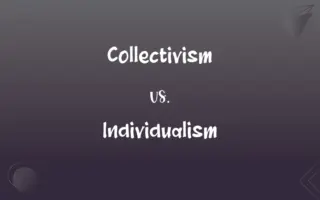Will Be vs. Shall Be: What's the Difference?
Edited by Aimie Carlson || By Janet White || Published on October 15, 2023
"Will Be" is a future tense indicator, often used universally; "Shall Be" indicates future too but has a more formal or determinative tone.

Key Differences
"Will Be" and "Shall Be" both address future actions or states. However, "Will Be" is generally more neutral and is frequently employed in American English. "Shall Be", while also pointing to the future, sometimes conveys a sense of determination or formal obligation.
In traditional British English grammar, "Shall Be" was typically used with first person pronouns ("I" and "we"), while "Will Be" was used with second and third person pronouns. However, this distinction has faded over time, and "Will Be" has become predominant, especially in American English.
"Shall Be" might appear in legal or official documents, suggesting a requirement or mandate. In contrast, "Will Be" is versatile, appearing in everyday speech, literature, and formal writings without any authoritative undertones.
The choice between "Will Be" and "Shall Be" is often stylistic or based on regional preferences. While "Will Be" is versatile and widely accepted, using "Shall Be" can add gravity or formality to a statement.
One must note that while these nuances exist, language is ever-evolving. The divide between "Will Be" and "Shall Be" is blurring, especially in everyday communication where context plays a pivotal role.
ADVERTISEMENT
Comparison Chart
Usage
Universal future indicator
Future with a formal or determined tone
Traditional Distinction
Used with 2nd and 3rd person
Used with 1st person
Common in
American English, casual speech
British English, legal documents
Connotation
Neutral
Authoritative or mandatory
Flexibility
Versatile in various contexts
Best suited for formal contexts
ADVERTISEMENT
Will Be and Shall Be Definitions
Will Be
Shows a future arrangement.
She Will Be joining us for dinner.
Shall Be
Indicates a future action, often with determination.
I Shall Be completing this task by evening.
Will Be
Indicates a future intention.
I Will Be visiting the doctor tomorrow.
Shall Be
Used in questions to seek suggestions.
Shall Be go to the park or the movies?
Will Be
Denotes a future action or state.
The meeting Will Be at 3 pm.
Shall Be
Demonstrates a future obligation.
All members Shall Be present for the meeting.
Will Be
Expresses a spontaneous decision.
I guess I Will Be the one to go.
Shall Be
Denotes an inevitability.
Justice Shall Be served.
Will Be
Expresses likelihood or prediction.
The sky is dark; it Will Be raining soon.
Shall Be
Expresses a formal future arrangement.
The proceedings Shall Be carried out as planned.
FAQs
Is "Shall Be" common in American English?
"Shall Be" is less common in American English and is more associated with formal or British contexts.
Is "Shall Be" more formal than "Will Be"?
Yes, "Shall Be" often has a more formal or determinative tone than "Will Be."
Can "Will Be" indicate a prediction?
Yes, "Will Be" can express likelihood or prediction about future events.
Can "Will Be" and "Shall Be" be used interchangeably?
Generally, yes, but context matters. "Shall Be" can sound formal or authoritative.
Is "Shall Be" still used in modern English?
Yes, especially in legal, formal, or British contexts.
Which is more authoritative, "Will Be" or "Shall Be"?
"Shall Be" can convey a more authoritative or mandatory tone.
Does "Shall Be" imply an obligation?
It can. For instance, in legal documents, "Shall Be" often indicates a requirement.
Is "Will Be" used with all pronouns?
In modern English, especially American English, "Will Be" is universally used with all pronouns.
Can "Shall Be" be used in questions?
Yes, often to seek suggestions, e.g., "Shall Be go to the park?"
Is "Will Be" definitive?
"Will Be" indicates a future action or state but doesn't inherently carry the determinative weight of "Shall Be."
About Author
Written by
Janet WhiteJanet White has been an esteemed writer and blogger for Difference Wiki. Holding a Master's degree in Science and Medical Journalism from the prestigious Boston University, she has consistently demonstrated her expertise and passion for her field. When she's not immersed in her work, Janet relishes her time exercising, delving into a good book, and cherishing moments with friends and family.
Edited by
Aimie CarlsonAimie Carlson, holding a master's degree in English literature, is a fervent English language enthusiast. She lends her writing talents to Difference Wiki, a prominent website that specializes in comparisons, offering readers insightful analyses that both captivate and inform.






































































